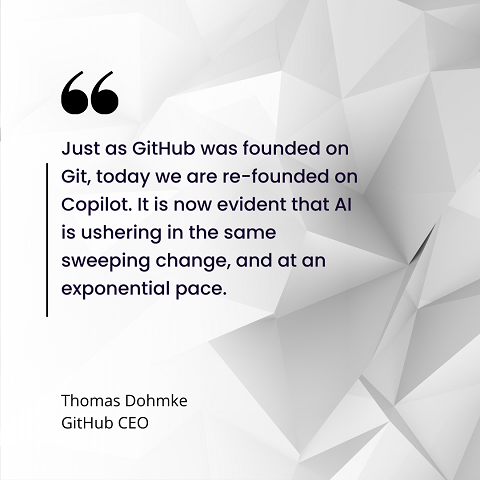GitHub Universe Doubles Down on AI as Developer Interest GrowsGitHub Universe Doubles Down on AI as Developer Interest Grows
GitHub Universe 2023 was largely about AI, with more capabilities and direct integration with the main GitHub website.

At its annual Universe conference that took place this week, GitHub announced a suite of new AI-powered products and features that aim to transform the developer experience. GitHub is embracing AI as core to its platform and reshaping itself as an AI-first company.
The focus of GitHub Universe 2023 was very different from a year ago — the2022 event focused on workflow and project management. This year, it was all about AI, with a series of new features that extend and more deeply integrate AI capabilities into the GitHub developer experience.
Alongside the new features, GitHub also released its annual Octoverse report, revealing the latest developer trends, which also has a strong focus on AI this year.
Among the key announcements:
GitHub Copilot Chat becoming generally available in December
A new Copilot Enterprise product launching in February 2024
The Copilot Partner Program allowing integration with developer tools
New AI-powered security features in GitHub Advanced Security
A preview of Copilot Workspace to streamline coding workflows
"Just as GitHub was founded on Git, today we are re-founded on Copilot," said GitHub CEO Thomas Dohmke (pictured) during the keynote. "It is now evident that AI is ushering in the same sweeping change, and at an exponential pace."
GitHub Copilot Going Mainstream
GitHub Copilot was originally launched in October 2021 and was a bit topic of conversation at the GitHub Universe 2021 event. Over the last two years, GitHub has significantly expanded Copilot in a number of ways.
At the 2023 event, GitHub announced that its code completion tool, Copilot Chat, will become generally available to all users in December. It is powered by OpenAI's latest GPT-4 model, providing more accurate suggestions and explanations. According to GitHub, with the new inline Copilot Chat, developers can chat about specific lines of code, directly within the flow of their code and editor.

Dohmke-GitHub
The company is also bringing Copilot Chat to its website, mobile app, and JetBrains IDEs, aiming to make Copilot ubiquitous throughout the coding process.
GitHub also announced Copilot Enterprise, which will personalize Copilot to each organization's own codebase and provide enterprise-level security. This is expected to help developers quickly ramp up on internal code and accelerate development. Copilot Enterprise will be generally available in February 2024.
GitHub's research lab, GitHub Next, previewed Copilot Workspace — a new way to automatically plan and implement solutions for issues. The workspace allows developers to steer the AI, build and test code, and get automatic fixes. The goal is to streamline ideas into pull requests with the power of AI.
GitHub's Annual Octoverse Report Reveals Generative AI Explosion
The GitHub Octoverse 2023 report reveals explosive growth in generative AI among developers on GitHub and increasing standardization of cloud deployments.
According to the report, generative AI projects on GitHub have more than doubled in 2023 compared with 2022.The report found that 92% of developers are already using or experimenting with AI coding tools. With the community rapidly adopting tools like GitHub Copilot, the company expects developers to drive further AI innovation.
Looking beyond AI, in examining programming languages and frameworks, GitHub found notable growth in cloud-native technologies such as Docker and infrastructure as code (IaC).
Overall adoption of Dockerfiles and IaC workflows increased sharply in 2023, indicating that developers are bringing more standardization to cloud deployments through GitHub.
Among the key findings in the Octoverse 2023 report:
India is projected to overtake the U.S. as the largest developer community on GitHub by 2027 based on growth rates.
92% of developers are using or experimenting with AI coding tools.
Adoption of cloud-native technologies like Docker and infrastructure as code increased sharply.
JavaScript remains the most popular language, but TypeScript overtook Java for the first time.
2023 saw the largest number of first-time contributors to open source projects.
About the Author
You May Also Like








.jpg?width=700&auto=webp&quality=80&disable=upscale)
